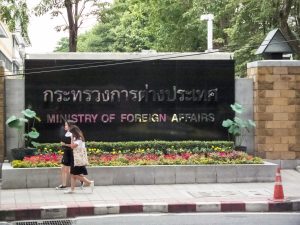The fog surrounding Thai Prime Minister Paetongtarn Shinawatra’s coalition government is clearing, with the cabinet line-up and policies expected to be in place by mid-September. Amid the wait, attention has zeroed in on changes in the dynamics of the coalition and the opposition, driven by the break-up and make-up of bizarre political alliances. Significant as they are, I’ve been more intrigued by the lack of conversation about the Foreign Ministry.
As with past cabinet formations, there’s hardly any political jockeying for the control of the foreign ministry, which is usually highly ranked in other countries. The public couldn’t care less whether the current foreign minister, Maris Sangiampongsa, stays or goes. And talks about the new administration’s foreign policy direction are limited to enthusiasts.
One might very well conclude that Thailand as a whole undervalues, or is at least apathetic toward, foreign relations.
That’s an uncomfortable reminder for foreign policy experts and mere observers like myself, who have been grumbling about Thailand’s shrinking international profile. It has been convenient to lay the blame entirely on incompetent leadership (the predecessor Prayut Chan-o-cha government has certainly received its share of criticism) and resist admitting that entrenched structural factors are also at play.
A verse from Thailand’s national anthem reads, “Thais are peace-loving, but no cowards when war comes,” reflecting the non-confrontational and inward-looking nature of the Thai people. Even without these traits, Thailand as a small power doesn’t have command over its own destiny when dealing with major powers; it can only do so with neighboring countries of comparable size. Such limitations are explained by Thailand’s esteemed diplomat Tej Bunnag, in his highly insightful interview that should be read by anyone interested in Thai diplomacy.
Furthermore, post-Cold War Thailand finds itself in a relatively benign strategic environment. The kingdom enjoys cordial relations with practically all major powers and neighbors, and has essentially no disputes in highly contentious areas. Lacking credible external enemies, and burdened with endless domestic troubles, maintaining a strong outward focus or resolve in foreign policy matters isn’t a requirement for the ruling elites. For the public, too, foreign policy literacy is a choice, not a necessity.
The result, then, is for Thailand to follow the Thai equivalent of the proverb “let sleeping dogs lie.” Put differently, the mission of Thai foreign policy becomes centered around sustaining Thailand’s existing position within the international system: avoiding making enemies, prioritizing relations with immediate neighbors – steadily rather than proactively – and seeking to enhance relations with major powers when circumstances allow.
As such, it’s unclear how tangible results are delivered and success is measured, especially considering the intricacies of inter-agency coordination and overlapping responsibilities. To the naked eye, the Foreign Ministry is forever a sideshow. Take, for instance, the evacuation of Thai workers from Israel. Although the Foreign Ministry played a crucial role, it was the sight of Air Force planes swooping in to retrieve the workers that made front-page headlines. Similarly, when it comes to trade, the Department of International Economic Affairs under the Foreign Ministry is responsible for studying and recommending directions for economic diplomacy. Yet, it’s the Ministry of Commerce that actually conducts international trade negotiations and concludes free trade agreements.
It should therefore come as no surprise that the Foreign Ministry’s budget is fairly tiny, accounting for around 0.2 percent of the government’s expenditures. The illustration below compares the Foreign Ministry’s draft budget for the 2025 fiscal year to that of eight selected “Grade A” ministries desired by politicians. It goes without saying that while the commerce ministry and energy ministry operate with smaller budgets than the Foreign Ministry, they oversee vital areas that hold profound financial value: regulations of trade, service business, and intellectual property for the former, and energy security for the latter.
For politicians, strong performance in one of the sought-after Grade A ministries, which are deeply intertwined with ordinary folks’ daily lives, significantly boosts re-election prospects. And, to frame it in a negative sense, these ministries offer avenues for corruption that are hard to find in the Foreign Ministry.
The Foreign Ministry’s lack of political allure ends up being both a gift and a curse. On the one hand, professionals likely have more room to do their job without much politicization. On the other hand, public scrutiny is minimal. The Ministry could ultimately be run by highly capable people or someone entirely unqualified, and the public might not care either way. With political interference pervading every aspect of Thai governance today, I fear that there might be less engagement from competent individuals who have the country’s best interests at heart.
The problem is that accepting the status quo won’t do any good for Thailand. Like it or not, the lines between international and domestic issues are blurring as major power competition intensifies and expands to prominently include domains directly impacting our everyday lives, be it technology, health, or meteorology. Being subjected to collateral damage (from the U.S.-China trade war, for example) and targeted foreign interference (whether from state actors or otherwise, all empowered by technological advancement) has become easier. To flourish in this shifting reality, Thailand must move beyond its comfort zone and assert its interests – without going into a tailspin and risking entanglement in conflicts. The quicker that can be done, the better.

































